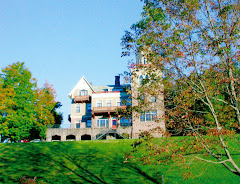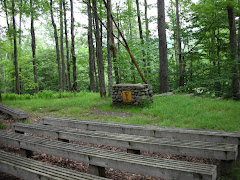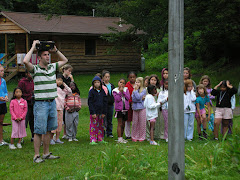* * *
Ira Greifer
In 1974-75, Halbe Brown, Eva Gottscho, and Dr. Ira Greifer
came together to co-found The Ruth Gottscho Kidney Center here at Frost Valley.
It was the first of its kind—a program through which children with kidney
disease could safely attend camp alongside healthy children. Eva brought her
Foundation and fierce determination that no child would be forced to look out
of a window and watch other kids going to camp without having the same
opportunity. Halbe brought this magnificent space and his ability to take risks
and his trusting attitude that if “you tell me we can, we will.” And Dr.
Greifer brought the resources of a major New York City academic medical center
along with his pioneering experience as a pediatric nephrologist. It is rare to find such synergy and the three
of them shared the same vision. [Above from left to right: Eva Gottscho, Halbe Brown, Ira Greifer and Bill Primack.]
Such a thing, in so remote a location, had never been tried,
and indeed some thought it was an outlandish idea. Dr. Greifer was at the time
the medical director of the Children’s Kidney Center at Albert Einstein
Hospital of Medicine (now Montefiore), the largest such unit in the northeast
U.S. and the only one in New York State. We must remember that it was only in
1973—just a year before the planning began to create our program—that Medicare
began to pay for the costs of dialysis; it was also a time when it was thought
too technically difficult to provide this type of therapy to children.
With crucial assistance from Dr. William Primack, one of Dr.
Greifer’s first Fellows—his first “ambassador” to Frost Valley for the project—he
worked with Frost Valley’s Chuck White on the careful design of the unit, and
did what today we would be right to consider the miraculous political work of having the new dialysis unit at Frost
Valley designated by the federal government and the State of New York an
official satellite of Einstein Hospital in the Bronx.
In Dr. Ira Greifer this stupendous effort found a person
with an already growing reputation as a true visionary for inclusive global
health in pediatrics—someone who knew medically, institutionally, and ethically
how to extend health care to children whose chronic condition had led many in
hospitals, schools and, alas, even families, to give up on their ever having a
chance to interact with healthy peers. Because of Dr. Greifer’s dauntless
vision, children on hemodialysis—in those days just about as restrictive an
ongoing medical treatment a child could have to endure—not only interacted with
healthy peers at camp, but they swam in a cold mountain lake, played kickball
with everyone else, screamed their village’s cheers after lunch, made real lasting
friendships, found in their counselors supportive and understanding big brothers
and sisters, and—most astonishingly—hiked to overnight campsites and slept out
under the stars, far away from the camp’s medical staff and even further from
understandably protective (and now remarkably gratified) parents and siblings. Dr.
Greifer gave these children, through his vision, the gift of a childhood.
Ira Greifer had entered the field of pediatric nephrology as
it was being defined at Albert Einstein College of Medicine by his mentor Dr.
Henry Barnett. Very soon Dr. Greifer was himself leading the way in his advocacy
on behalf of children’s medical and psycho-social needs (the latter was then a
very new consideration), in his support of research and education in nephrology
and pediatrics generally, and in his hard pushing for legislation to enable
better delivery of health care to kids with chronic illness. He created an
innovative family-centered care project, the famed “Mothering in Hospital
Program”; worked with Senator Jacob Javits to establish the New York State Kidney
Disease Institute; served as medical director of the National Kidney
Foundation; made possible the funding of training fellowships that supported
more than a thousand Fellows; and played a leadership role in the passage of
federal legislation establishing access to dialysis treatment or the
opportunity for transplantation as an equal right. Dr Greifer taught several
generations of Fellows and his wisdom and sense of “the possible” lives on
through them.
With all this going on, and while attaining the position of
Director of Pediatrics at Einstein, he was actively involved in Frost Valley’s
kidney camp program for a quarter century. He would simply not let the
experiment fail, and that was no easy task. Dr. Rick Kaskel, a protégé of Dr.
Greifer, was recruited—at the time Rick might have said exiled; he was forced to go!—to Frost Valley in 1978, and was truly
astonished when he first saw the hard work being done to support the children
while at camp. There were four beds in the unit, each next to a hemodialysis
machine; with fifteen to twenty campers, all at first on hemodialysis, the
doctors, nurses and technicians were dialyzing the campers six days per week,
eight campers per day, each undergoing dialysis treatment every other day.
During camp sessions of more than 16 children, there were double and
occasionally even triple daily shifts. This intense medical service continued
to make mainstreaming at camp possible for these socially and physically
vulnerable children, and then in the 1980s, when new treatment modalities
became available—transplantation, peritoneal dialysis (requiring sterile CAPD
exchanges four times per day)—the capacity of Frost Valley’s kidney
camp-within-a-camp to serve chronically ill kids doubled and tripled, and so
the already revolutionary program was revolutionized still further. [Above: Rafik Ghobrial introduces the induction of Dr. Greifer, as Rick Kaskel waits to receive the plaque, which he will then give to Dr. Greifer in person.]
Frost Valley’s trustees have already honored Halbe & Eva
with induction to the Hall of Fame. It is fitting that the circle is now closed
with the induction of the third of these formidable people. The Board of
Trustees of Frost Valley YMCA takes this time to recognize a world-renowned
leader in pediatrics who has devoted so much insight and energy to the program
here, but it is especially appropriate that his entrance into Frost Valley’s
Hall of Fame coincides with the fortieth
consecutive summer of our kidney program—of the project that was once deemed a
truly impossible dream. That such an impossibility is now considered “just part
of camp” is itself a testament to Dr. Ira Greifer’s true powers of tenacity and
imagination.














